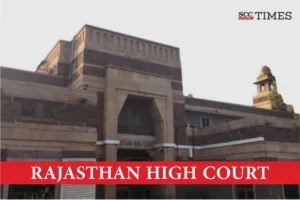Rajasthan High Court: In an appeal against the order of acquittal from the charge under Section 276 CC of the Income Tax Act, 1961 (Act) by the Special Magistrate (Economic Offences), Rajasthan, Jaipur, a single-judge bench comprising of Anoop Kumar Dhand, J., upheld the order of acquittal, considering the absence of mens rea and reasonable doubt in the prosecution’s case as the case under Section 276CC of the Act is not found to be proved against the respondent.
In the instant matter, the Income Tax Officer (ITO)-appellant filed a criminal complaint against the respondent for not submitting Income Tax Returns under Section 139(1) of the Act before 31.07.1978. The respondent submitted the returns on 31.12.1980. Subsequently, a penalty of Rs. 2200/- was imposed on the respondent under Section 271(1) of the Act. The appellant examined witnesses, and charges were framed against the respondent. The respondent denied the charges, claimed trial, and no defense evidence was produced. The Special Magistrate (Economic Offences), Rajasthan, Jaipur, vide order dated 31-08-1991, acquitted the respondent. Aggrieved by the impugned order of acquittal, the appellant preferred an appeal challenging the same. The appellant contended that the respondent’s delayed submission of income tax returns constitutes an offense under Section 276CC of the Act. The respondent argued that the delay was not willful and did not involve mens rea. It was further asserted that the judgment was based on a thorough consideration of evidence and should not be interfered with. However, the defense argued that the delay was not intentional and there was no mens rea on the part of the respondent.
The Court noted that the prosecution alleged that the respondent failed to comply with Section 139(1) of the Act by submitting returns after a delay of 28 months. The Court examined the relevant provisions of Sections 139(1) and 276 CC of the Act and highlighted the requirement for timely submission of returns. The Court noted that Section 276 CC imposes penalties for willful failure to furnish income tax returns within the stipulated time.
“For bringing home the charge against the accused for his conviction under Section 276CC of the Act of 1961, it is essential on the part of the Income Tax Department to prove that there was willful attempt to evade any tax, penalty or interest chargeable.”
The Court considered the respondent’s explanation for the delay, emphasising on the absence of mens rea or intention to evade taxes. The Court referred to legislative amendments and Prem Das v. ITO, (1999) 5 SCC 241, to highlight the importance of proving mens rea for conviction under Section 276 CC. The Supreme Court in Prem Das (Supra) held that “willful attempt to evade any tax, penalty or interest chargeable or imposable under the Act under Section 276-C is a positive act on the part of the accused which is required to be proved to bring home the charge against the accused.”
The Court stated that it is the settled principle of law that “while appreciating the evidence, in an appeal against acquittal, if the appellate Court finds that two views are plausible, then the view favouring the innocence of an accused must be taken into consideration.” The Court held that the Income Tax Department has failed to prove the guilt of the accused respondent beyond all reasonable doubts. The Court found no perversity in the trial court’s and upheld that the trial court’s decision to acquit the respondent due to lack of proof of mens rea and the absence of prior notice to the respondent. The record is to be returned to the Court below.
[ITO v. Rajendra Prasad Vaish, 2024 SCC OnLine Raj 933, order dated 02-04-2024]
Advocates who appeared in this case :
Mr. Siddharth Bapna, Counsel for the Petitioners
Mr. Shiv Pratap Singh Rathore, Counsel for the Respondent

